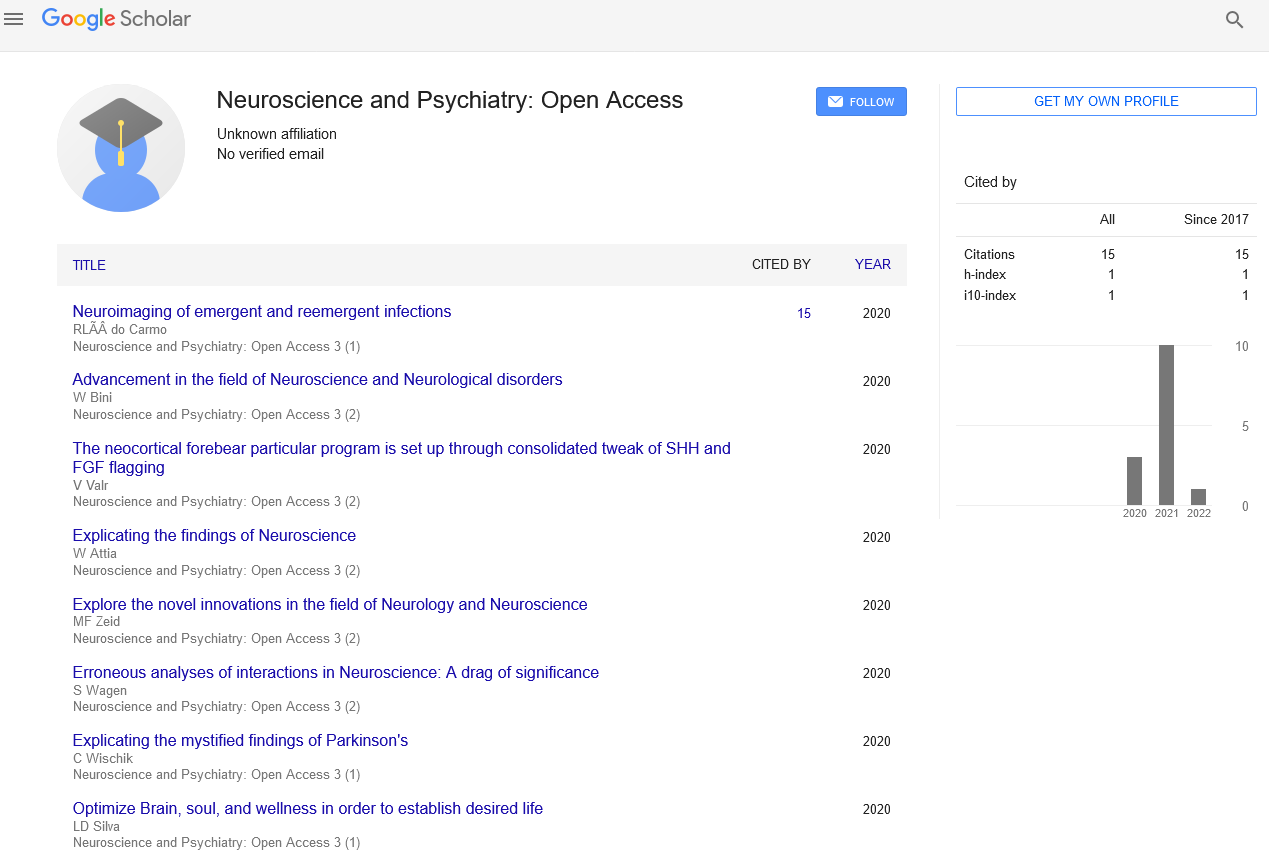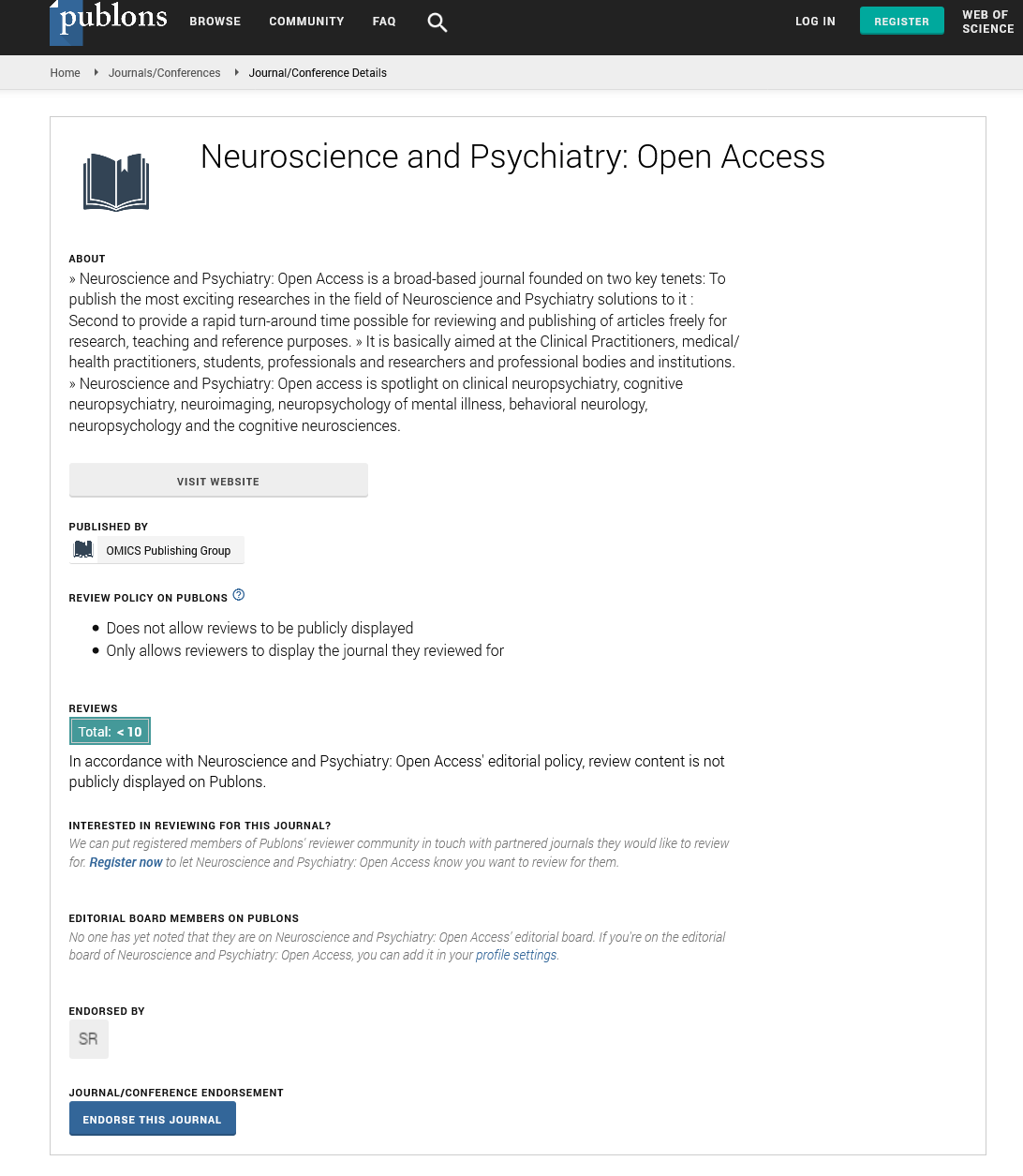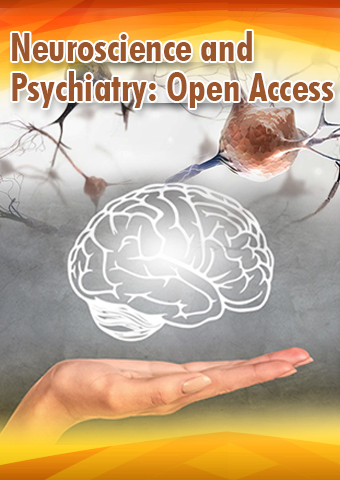Perspective - Neuroscience and Psychiatry: Open Access (2024) Volume 7, Issue 6
Neurotransmitters and Their Influence on Mental Health Disorders
- Corresponding Author:
- Chang-Hao Kao
Department of Neurobiology,
Harvard Medical School,
Massachusetts,
USA
E-mail: chang-hao@yale.edu
Received: 12-11-2024, Manuscript No. NPOA-24-148644; Editor assigned: 15-11-2024, PreQC No. NPOA-24-148644 (PQ); Reviewed: 29-11-2024, QC No. NPOA-24- 148644; Revised: 10-12-2024, Manuscript No. NPOA-24-148644 (R); Published: 17-12-2024, DOI: 10.47532/npoa.2024.7(6).284-286
Introduction
Neurotransmitters, the chemical messengers of the brain, play a pivotal role in regulating a wide range of bodily functions and behaviors. These chemicals transmit signals between neurons, allowing the brain to communicate with the rest of the body. The delicate balance of neurotransmitters influences everything from mood and cognition to motivation and sleep. Imbalances in these chemicals are often linked to mental health disorders, including depression, anxiety, schizophrenia, and bipolar disorder. Understanding how neurotransmitters function and their connection to mental health can offer insights into the treatment of these disorders and promote better mental well-being.
Description
The role of neurotransmitters in the brain
Neurotransmitters are released by neurons and travel across synapses (the small gaps between neurons) to bind with receptor sites on adjacent neurons. Once bound, they trigger or inhibit electrical signals, which determine how the brain processes information and regulates various bodily functions.
There are two broad categories of neurotransmitters: Excitatory neurotransmitters, which stimulate brain activity, and inhibitory neurotransmitters, which calm brain activity. Some neurotransmitters, like serotonin and dopamine, can have both excitatory and inhibitory effects depending on the receptors they bind to.
The major neurotransmitters involved in mental health disorders include:
Serotonin: The mood regulator
Serotonin is perhaps the most well-known neurotransmitter associated with mood regulation. It is primarily found in the brain, intestines, and blood platelets, and plays a crucial role in maintaining mood balance, sleep, and appetite.
Impact on mental health
Serotonin deficiency is closely linked to depression and anxiety disorders. Low levels of serotonin can result in feelings of sadness, irritability, and fatigue. Additionally, disruptions in serotonin levels are implicated in other mental health conditions, such as Obsessive-Compulsive Disorder (OCD), panic disorder, and Post-Traumatic Stress Disorder (PTSD).
Treatment
Selective Serotonin Reuptake Inhibitors (SSRIs) are a common class of medications used to treat depression and anxiety disorders by increasing the availability of serotonin in the brain. SSRIs block the reabsorption of serotonin into neurons, making more of it available to improve mood and alleviate symptoms.
Dopamine: The reward and motivation chemical Dopamine plays a significant role in the brain’s reward and pleasure systems. It is responsible for regulating motivation, attention, and motor control. Dopamine levels fluctuate in response to rewarding stimuli, such as eating, socializing, or achieving a goal.
Impact on mental health
An imbalance in dopamine is strongly associated with several mental health disorders. Excessive dopamine activity is linked to schizophrenia, where patients may experience hallucinations, delusions, and disordered thinking. On the other hand, reduced dopamine levels are associated with conditions like depression and Parkinson’s disease. In depression, low dopamine levels can lead to a lack of motivation, pleasure, and energy, a state known as anhedonia.
In addition, dopamine dysregulation is a core feature of substance use disorders, where drugs of abuse hijack the brain’s reward system, leading to addictive behaviors.
Treatment
Antipsychotic medications, commonly used to treat schizophrenia, often target dopamine receptors to reduce the hyperactivity of dopamine in the brain. Dopamine-boosting medications, such as bupropion, are sometimes used in treating depression, especially for individuals with symptoms of fatigue and lack of motivation.
Norepinephrine: The stress response regulator
Norepinephrine, also known as noradrenaline, is a neurotransmitter that is involved in the body’s fight-or-flight response. It plays a role in alertness, arousal, and stress management, and helps the body respond to stressful situations by increasing heart rate, blood pressure, and energy levels.
Impact on mental health
Imbalances in norepinephrine are linked to mood disorders such as depression and anxiety. Low levels of norepinephrine are associated with symptoms of depression, including fatigue, poor concentration, and a lack of interest in daily activities. Conversely, heightened norepinephrine levels can lead to anxiety, hyperactivity, and irritability.
Norepinephrine dysregulation is also implicated in Attention Deficit Hyperactivity Disorder (ADHD), where patients may struggle with attention, impulse control, and hyperactivity.
Treatment
SNRIs (Serotonin-Norepinephrine Reuptake Inhibitors) are a class of antidepressants that increase the availability of both serotonin and norepinephrine. Medications like venlafaxine and duloxetine are commonly prescribed to manage depression and anxiety by balancing norepinephrine levels in the brain.
GABA: The brain’s calming agent
Gamma-Aminobutyric Acid (GABA) is the primary inhibitory neurotransmitter in the brain. It helps to calm neural activity and plays a crucial role in reducing anxiety and promoting relaxation. GABA’s function is to prevent over-excitation of neurons, which can lead to symptoms of anxiety or seizures.
Impact on mental health
GABA deficiency is strongly associated with anxiety disorders. Low levels of GABA can lead to hyperactivity in the brain, resulting in excessive worry, fear, and panic. Disorders such as Generalized Anxiety Disorder (GAD), panic disorder, and social anxiety disorder are often linked to impaired GABAergic function.
Additionally, GABA imbalances are implicated in epilepsy and sleep disorders, where insufficient GABA activity can result in seizures or insomnia.
Treatment
Benzodiazepines, a class of medications commonly used to treat anxiety, work by enhancing the effects of GABA. These drugs help reduce anxiety by promoting relaxation and reducing neural excitability. Other medications, such as anticonvulsants, also target GABA to prevent seizures.
Glutamate: The brain’s excitatory workhorse
Glutamate is the most abundant excitatory neurotransmitter in the brain, playing a critical role in learning, memory, and cognitive function. It is essential for synaptic plasticity, the process by which neural connections strengthen or weaken over time, which is key for learning and adapting to new information.
Impact on mental health
Glutamate dysregulation is implicated in a variety of mental health disorders. Elevated glutamate levels are associated with neurodegenerative diseases such as Alzheimer’s and Huntington’s disease, where excessive excitatory activity can damage neurons. On the mental health front, glutamate imbalances are linked to depression, particularly treatment-resistant depression, where traditional antidepressants fail to relieve symptoms.
Schizophrenia is another disorder associated with abnormal glutamate activity, with research suggesting that glutamate dysfunction may contribute to the cognitive and negative symptoms of the condition, such as disorganized thinking and social withdrawal.
Treatment
Recent advancements in depression treatment involve targeting the glutamate system. Ketamine, a medication that modulates glutamate activity, has shown rapid antidepressant effects in individuals with treatment-resistant depression. Ongoing research is exploring the potential of glutamate-based therapies for other mental health disorders, such as schizophrenia.
Acetylcholine: The attention and learning facilitator
Acetylcholine is a neurotransmitter involved in memory formation, learning, and attention. It is essential for cognitive processes and plays a role in both the central and peripheral nervous systems. Acetylcholine helps regulate functions such as muscle contraction and heart rate, in addition to its cognitive roles.
Impact on mental health
Reduced levels of acetylcholine are associated with cognitive decline and neurodegenerative diseases like Alzheimer’s. patients with Alzheimer’s disease typically exhibit a loss of cholinergic neurons, leading to memory loss, confusion, and impaired cognitive function.
While acetylcholine imbalances are not as strongly linked to mood disorders as other neurotransmitters, cognitive deficits in mental health conditions like schizophrenia and ADHD may involve dysregulated acetylcholine signaling.
Treatment
Cholinesterase inhibitors, such as donepezil, are used to treat Alzheimer’s by increasing acetylcholine levels in the brain. These drugs help slow the progression of cognitive decline in patients by enhancing communication between neurons. Research is also ongoing into the role of acetylcholine in enhancing attention and focus in ADHD treatment.
Conclusion
The genetics of Major Depressive Disorder (MDD) provide valuable insights into the etiology and potential treatment of this complex condition. Genetic markers, heritability estimates, family studies, twin studies, and geneenvironment interactions all contribute to our understanding of the genetic underpinnings of MDD. Advances in genetic research have the potential to improve diagnosis, personalize treatment, and inform prevention strategies. As research progresses, a more comprehensive understanding of the genetic and environmental factors contributing to MDD will likely emerge, offering hope for better outcomes for individuals affected by this debilitating disorder.


